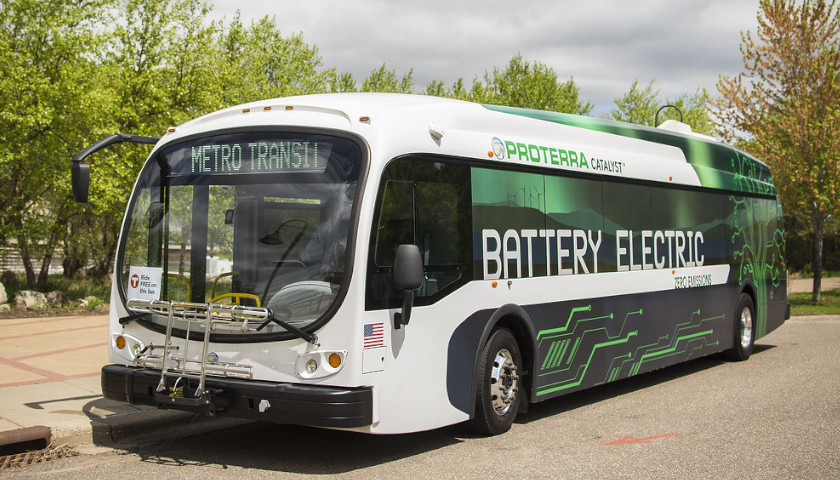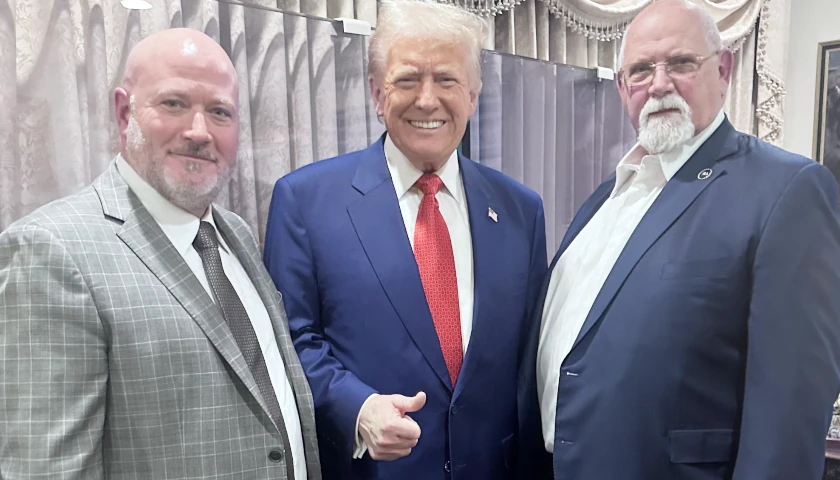by Kevin Killough
Across the country, towns and cities of various sizes envisioned an electrified public transit system that could shuttle residents with vehicles that produced no carbon-filled exhaust.
Many of those communities purchased buses from Silicon Valley-based Proterra, which was able to produce 550 buses over its 19-year existence before it went bankrupt in August.
The company announced last month it had concluded auctions as part of its Chapter 11 bankruptcy process, and in the wake of its collapse public transit systems tell Just The News they have inoperable buses that can’t be repaired because the company is slow to supply parts to fix them.
Crony Capitalism
Early on, the company’s customers were noticing issues with the buses. The Massachusetts Bay Transportation Authority purchased five Proterra buses in 2019. The company promised ranges of 100 to 120 miles on a single charge, but the authority found they ran as little as 60 to 100 miles on a charge — even less in cold weather.
For a while, things looked pretty good for the company. Proterra’s initial public offering in January 2021 raised nearly $650 million, which was three times more than its revenues.
In April 2021, President Joe Biden took a virtual tour of a Proterra facility, using it to promote his infrastructure plan, which included approximately $6.5 billion in grants, according to the Wall Street Journal, to help replace diesel-powered school and transit buses with electric vehicles. “The fact is, you’re making me look good,” the president said.
The giveaways were in addition to $40,000 per vehicle in tax credits from the Inflation Reduction Act (IRA) for purchasing electric commercial vehicles. Proterra also benefited from tax credits for its battery manufacturing.
Jennifer Granholm, Biden’s energy secretary, had served on the company’s board. In May 2021, before assuming the lead at the Department of Energy, Granholm sold all her Proterra holdings, providing her with net capital gains of $1.6 million.
“It’s the essence of crony capitalism,” David Blackmon, energy writer and analyst, told Just The News.
Early Adopter
As the bankruptcy proceedings wind through the process, many of the communities that own the buses, which cost about $1 million each, are struggling to keep them running.
The San Joaquin Regional Transit District (RTD), which includes Stockton, California, was an early adopter of electric buses, purchasing two from Proterra in 2013. Since then, the RTD bought 15 more. Six of the 17 total are currently inoperable and awaiting parts.
“RTD is thankful for its partnership with Proterra and its experience, including lessons learned as battery-electric technology evolves and continues to advance,” Merab Talamantes, RTD project controls manager, told Just The News, adding that two electric buses within the RTD fleet from another manufacturer are also broken down.
Based on communications with the company, she said, RTD expects the parts to arrive within 30 to 90 days.
Talamantes said the RTD has also had challenges with its bus charging infrastructure. The district operates four 500-kilowatt fast charging stations and five 60-kilowatt chargers. Proterra doesn’t have a valid California business license to complete work on the RTD chargers.
There are also problems with the chargers’ software, which is proprietary. Since RTD staff doesn’t have the tools or training to troubleshoot or repair them, it has to rely solely on Proterra to provide that service. This has left one charger inoperable for the last four months due to limited Proterra personal and software troubleshooting tools, Talemantes said.
Parts for the chargers are sometimes several months on backorder. To keep the chargers running, the district purchased used Proterra chargers and parts from another transit agency that ended its electric bus program.
“Although RTD has faced challenges with its Proterra fleet, as one of the first transit agencies to operate zero-emission buses in the county, it recognizes that its partnership with Proterra pushed BEB [battery-electric bus] technology to the advanced stage that it is in today,” Talamantes said.
Waiting For Parts
Proterra didn’t respond to requests for comment on this story.
The problems with the Proterra buses go back to well before the company’s bankruptcy. PBS/NPR affiliate WHYY reported in July 2021 that South Philadelphia transit system purchased some of the buses, which stopped running when their chassis cracked.
In August 2021, the Minnesota Reformer reported that Duluth’s planned transition to an all-electric bus fleet also ran into problems with cracked chassis. The buses were also failing to drive up steep hills. The Duluth Transit Agency and Proterra told the Reformer that the cracks were “a cosmetic problem.”
More recently, the CBC reported that the city of Edmonton in Alberta, Canada, purchased 60 of the buses, and most of them aren’t running. More than half need replacement parts. Some of the buses have been down for over a year waiting for parts to come in.
The Southern Teton Area Rapid Transit (START) system, a joint operation between Jackson and Teton County, Wyoming, purchased eight of the buses. Cowboy State Daily reported in September that none of the buses were running at the time. Bruce Abel, START director, told Just The News that the system has managed to get two of those buses running.
“Proterra continues to work through their bankruptcy procedures. As part of that process, they have had some financing freed up to allow them to resume supplying parts,” Abel said. He said START continues to work with the company, and they believe they can get a third bus up and running this winter. “Beyond that we are waiting to see how the bankruptcy process proceeds,” Abel said.
Jacob Matsen, transit planning supervisor for the Mountain Metro Transit of Colorado Springs, Colorado, told Just The News that the district purchased four Proterra buses, and two of those aren’t running.
The company sent a technician to work on the inoperable buses, and they’re trying to determine what parts are needed for the repairs.
The Albuquerque, New Mexico, transit district, ABQ RIDE, has five Proterra buses in its fleet, all of which are currently running. Megan Holcomb, spokesperson for ABQ RIDE, told Just The News that all five buses are still under warranty. The district runs a full maintenance shop, she said, and they haven’t had any problems obtaining parts for repairs. “ABQ RIDE maintains a relationship with our Proterra representative which will carry over when the company shifts to new management,” Holcomb said.
Unprecedented government funding
Blackmon said that Biden’s energy policies include a lot of funding for politically connected companies, and so he expects more boondoggles to come down the pipeline. “Some of the projects are very viable and are going to succeed, and they’re gonna have great success. And then you’re gonna have this whole population of other projects that don’t exist for any other reason than to get the government money,” Blackmon said.
In a quarterly filing this summer, just before it announced its bankruptcy, Proterra remarked on how important government funding is to its business model.
in 2020 Proterra received a PPP loan of $10 million that was forgiven, but Proterra has enjoyed handouts from more than just the federal treasury. According to The California Globe, California has given Proterra at least $6 million in grants.
“We expect that the availability of this now unprecedented level of government funding for our customers, suppliers, and competitors to help fund purchases of commercial electric vehicles and battery systems will remain an important factor in our company’s growth prospects,” Proterra stated in the filing.
– – –
Kevin Killough is a reporter for Just the News.
Photo “Proterra Bus” by Metro Transit. CC BY-NC-ND 2.0.








